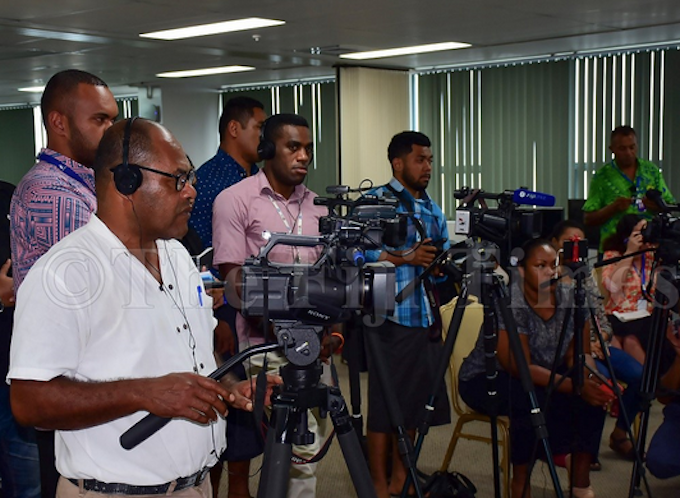
By Luke Nacei in Suva
Fiji has no place for a partisan media using press freedom as a blank cheque to be a mouthpiece of government, says opposition National Federation Party leader Professor Biman Prasad.
In a statement to mark World Press Freedom Day last week, Professor Prasad urged journalists to be fearless and amplify the truth and voice of the people at all times.
He said it was critically important for the media to be impartial and to amplify the voice of the people without fear — especially in an election year.
“Since September last year, the media, particularly The Fiji Times and Communications Fiji Ltd, operators of five radio stations and the vastly popular FijiVillage news site, have been repeatedly criticised by government for amplifying the voice of the people through their elected representatives,” he said.
“The Fiji Times and CFL are simply doing what any media organisation should do at all times. They are simply performing their fundamental role as an effective watchdog of government.
“They are the messenger of truth, but unfortunately the truth is unpalatable to the current government because its broken promises and failed policies that are severely hurting the people, are being exposed.
“The Attorney-General’s statement in Parliament on September 24 last year, while agreeing to the tirade against The Fiji Times and CFL by Assistant Minister Selai Adimaitoga for the media to declare which political party they support in their editorial policy, is the clearest indication of government preferring a pro-FijiFirst and partisan media in the country.
‘Freedom of expression’ right
“Instead, government must fully adhere to Article 19 of the Universal Declaration of Human Rights which states, ‘Everyone has right to freedom of opinion and expression’.
“This right includes freedom to hold opinions without interference and to seek, receive and impart information and ideas through the media regardless of frontiers.
“This freedom and right are reposed in the people, which the state and politicians must respect at all times.
“Therefore, it is totally wrong and unethical for government or anyone to launch a tirade against the media organisation and their news director or editor-in-chief just because they don’t like the media amplifying the truth and voice of the people without fear.
“Do the right thing – shoot the message, not the messenger.”
MIDA Act ‘dangerous’ for Fiji media
Meanwhile, Pacific Media Watch reports that the Fijian Media Association (FMA) issued a statement welcoming the Reporters Without Borders (RSF) 2022 World Press Freedom Index, in which Fiji’s ranking slipped by 47 places to 102nd in 180 countries. RSF criticised the legislation in Fiji that “criminalised” journalism.
The statement said that while the Fiji media was under pressure “the Fijian media remains bold and thriving, and committed to fulfil its role”.
“Who defines what is against the public interest or what is against the national interest?” asked the statement by general secretary Stanley Simpson.
“While the Fijian media have been doing their best to be bold and free and abiding by their code of ethics — these laws are making many organisations and editors hesitate about publishing or broadcasting certain views that may go against the government based on how [it] may interpret that legislation and come after a media organisation.
“The fines are too excessive and designed to be vindictive and punish the media rather [than] encourage better reporting standards and be corrective.
“Media organisations are almost unanimous in seeking removal of the harsh fines and a review of the Act [Media Industry Development Authority (MIDA) Act].
“It is dangerous for media freedom now and also in the future. The MIDA Act has been ineffective and has done little to nothing to raise media standards,” the FMA statement said.
RSF changed its system of analysis this year to include a breakdown on specific categories such as legal framework and justice system, technological censorship and surveillance, disinformation and propaganda, arbitrary detention and proceedings, independence and pluralism, models and good practices, media sustainability, and violence against journalists, which partially explains Fiji’s sudden major fall on the Index.
Luke Nacei is a Fiji Times reporter. Republished with permission and additional reporting by Pacific Media Watch.












































